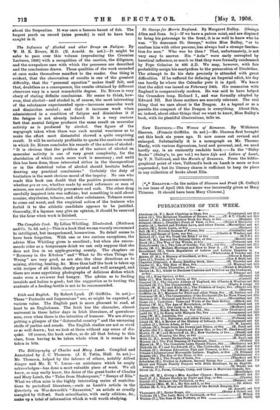The Influence of Alcohol and other Drugs on Fatigue. By
W. H. R. Rivers, M.D. (E. Arnold. 68. net.)—It might be safer to pass over this volume (reproducing the Croonian Lectures, 1906) with a recognition of the caution, the diligence, and the scrupulous care with which the processes are described and the conclusions drawn. These qualities of the work recorded at once make themselves manifest to the reader. One thing is evident, that the observation of results is one of the greatest difficulty, that the "personal equation" makes itself felt, and that, doubtless as a consequence, the results obtained by different observers vary in a most remarkable degree. Dr. Rivers is very chary of stating definite conclusions. He seems to think, how- ever, that alcohol—and alcohol is, of course, the most interesting of the substances experimented upon—increases muscular work and diminishes mental ; and that it increases work when administered in a condition of fatigue and diminishes it if the fatigue is not already induced. It is a very curious fact that mental fatigue produces the same result on muscular activity as is produced by alcohoL One figure of the ergograph taken when there was such mental weariness as to make the effort most distasteful showed a quite surprising result. It will be certainly profitable to quote the cautious words in which Dr. Rivers concludes his records of the action of alcohol: "it is obvious that the problem of the nature of alcohol on muscular activity is one of very great complexity, for the elucidation of which much more work is necessary ; and until this has been done, those interested either in the therapeutical or in the dietetical value of alcohol should hesitate before drawing any practical conclusions." Certainly the duty of hesitation is the most obvious moral of the inquiry. No one who reads this book can doubt that the positive pronouncements, whether pro or con, whether made by social reformers or men of science, are most distinctly premature and rash. The other drug carefully inquired into was caffeine; but something is said about cocaine, strychnine, tobacco, and other substances. Tobacco seems to come out worst, and the empirical action of the trainers who forbid it to the athletic candidate appears to be justified. Generally, if a layman may give an opinion, it should be reserved for the hour when work is finished.








































 Previous page
Previous page